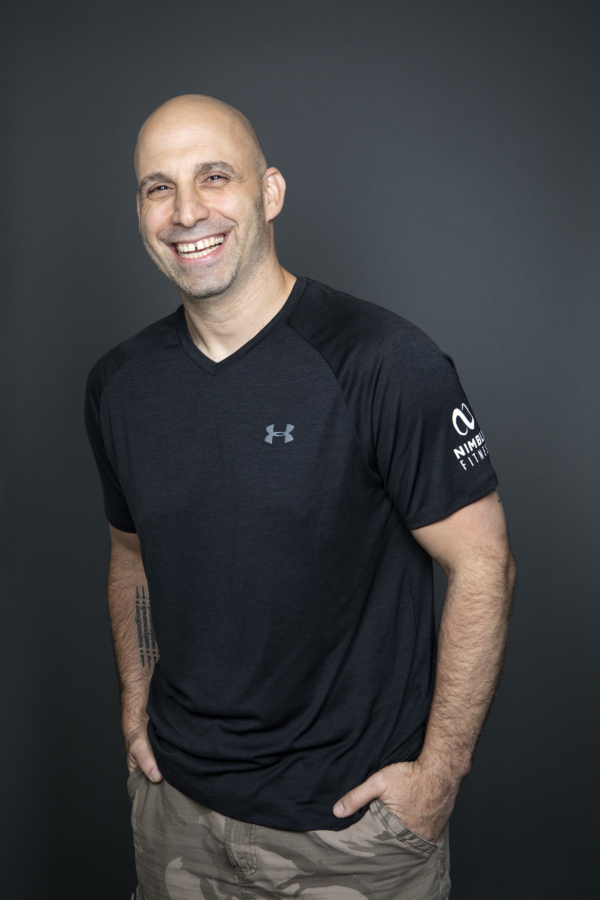
Chronicles of a Chubby Trainer
by Nimble Co-Owner, Jason Pulido
I’ve been a Personal Trainer in New York City for the past 23 years, and am now one of the Co-Owners of Nimble Fitness in Lower Manhattan. As a fitness professional and competitive athlete for 44 years, I have seen my weight fluctuate quite a bit during that time-more than 50lbs-back and forth. During my life, my weight has shifted with sport seasons/holidays/relationship successes (and failures)/work stress and more. I’ve hid myself under loose clothing, and developed a mental armor that says, “It’s not what you look like that makes you a great trainer, it’s your understanding of people and the human body.” I haven’t often shared this part of my life story, because it’s embarrassing and I feel ashamed by it. In this piece, I’d like to give you insight into some of the struggles, and many of the unspoken truths, that are a part of that story.
The story begins with my blueprint. All of us carry blueprints, which are patterns of behavior that often start when we are children, but also may develop as we progress through our adulthood. Some blueprints serve us well; for me, those “good” blueprints include working hard, being committed and consistent, coming from a place of love when working, and being the best father, son, brother, husband, uncle, friend, etc. that I can be.
Our blueprints are not always positive, however. One blueprint of mine that doesn’t serve me well at all has been my relationship to food. There are two major forces that created this particular blueprint in me: First, the wrestling blueprint. I was a competitive wrestler all the way back to elementary school. During wrestling season, we often had to “cut weight” in order to get down to the lowest possible weight class that our bodies could handle. This was usually done without much guidance, and often included many days/nights of not eating or drinking, which helped “make weight,” but which would then be immediately followed by binge eating. I could easily lose 8-10lbs in 24 hours, which as you can imagine, was not very good on my body. I would often gain that 8-10lbs right back after losing it!
I would often reach my “goal weight,” only to celebrate by eating things I had deprived myself of, and would then immediately put the pounds back on. Maybe they would come back slowly at first, because many of my “good” habits were still around, but they too often slipped as the “bad” habits came back.
Losing/gaining/losing/gaining/losing/gaining/losing/gaining…for 44 years! I’ve always known how to lose the weight after gaining, but those methods often included: crash dieting, cutting carbs, excessively exercising, obsessing about food, obsessing about weight, worrying about what I could and couldn’t have. The biggest problem with this blueprint is that I would always manage to lose the weight…but my relationship with food didn’t change.
The other really strong blueprint that has had a big impact on me was that I grew up pretty poor. Food was always present, but quality/quantity was limited. The food sources weren’t the best, and my mom often had to work double shifts waitressing to make ends meet, so my brother and I often ate alone. When we did eat together and spent time together on days off or holidays she would often make our favorite meals…lasagna, spaghetti/meatballs, chicken cutlets. These meals were big, and when you are poor, you don’t waste food. Also, if we went to my grandmother’s house, there was always food–loaves of bread and boxes of cookies and desserts from the bakery she worked at. She would bring home a full box of cookies and a loaf of bread for me that I would eat within like 15 minutes!
It’s always been amazing to me, that no matter how big a meal has been put in front of me in my life, I have always been able to eat it…ALL of it. Part of the issue is how fast I eat, which goes back to bingeing after weighing in for wrestling; another part of it goes back to those happy family moments when we had time together and plenty of yummy food on the table. These memories are so strong. Food has always been a very focal part of my life.
Looking at the various aspects of my blueprint has helped me recognize the patterns that weren’t helping me, and has shifted my thinking and behavior to something more sustainable and enjoyable. I can enjoy food without overeating. I can exercise for fun and not the job of “losing weight”. I can have foods that aren’t good for me without overindulging.
So, understanding the way that food has been part of my life, and part of my successes and failures throughout the journey, has helped me gain a healthier relationship with it. I feel, maybe for the first time, that my relationship with food is mostly healthy. I have to keep a check on myself from overindulgence, but even when I do, I don’t beat myself up over it. I shrug it off and get back to doing what I was doing. I don’t allow myself to go back down the rabbit hole of behaviors that will only lead me to feeling worse about myself. I’ve found that keeping as close to the “80/20 rule” helps me course correct in real time, instead of bingeing/starving.
Now, I try to live by the 80/20 rule: do really well 80% of the time, but allow myself to enjoy life and foods that might normally I would cut out completely (read: cookies/cakes/breads/candy) only to binge on them at some point and “closet-eat” them because I am embarrassed to eat them in front of other people. You know, because I’m a fitness professional!
Another big factor in my relationship with food (and this really applies to everyone) is the language we use—especially that inner voice we all have. Many of the words we say to ourselves, or that other people say to us, can dictate how we view ourselves. These other voices could be in the form of parents/coaches/partners/co-workers/etc.
I titled this article “Chronicles of a Chubby Trainer”. Now where did those words come from?
These are some of the things I’ve either said to myself or other people have said to me directly over the years:
- You are fat
- You need to lose weight
- You are not representative of the brand
- You need to look the part
- You look bulky
- You look skinny
- You are overweight
- You are a fat f*ck
- You used to be fit/in shape
- Your clothes don’t fit you
These words, whether they were my reality or not, have stuck inside my thought patterns. I think a big part of my existence I have felt “chubby”. So who is the “real” me? Am I the guy who had the six-pack as a wrestler, or the chubby guy who crashed diets, excessively exercised and stressed constantly about his weight? Is my self-perception based on the attitudes of other people? Magazines? Movies? It’s hard to really tell exactly where it came from, but my guess is a combination of them all. It doesn’t matter so much to me where it came from, just that I chose to believe it.
Getting out of that “chubby” mindset was, at first, about being kinder to myself. And being kinder to myself didn’t really start until I turned 39 years old, a little more than 5 years ago. I had, like so many times in the past, gained a bunch of weight, and I decided that by the time I turned 40 I would be back to what I weighed on my 30th birthday, which is a weight I feel pretty comfortable at-200 lbs. Once I got there, I decided that I would never allow myself to go over 215 pounds again. It was a little agreement I made with myself. And though I have poked over 215 since, I have always used that number to push my habits back in the right direction.
Since my 40th birthday, I have gained and lost weight within that 15 pound window a number of times. Through that process, I realized that, though I was doing a better job of being kinder and healthier to myself, I was still missing out on a big part of what I love about being a trainer and coach in the fitness industry. Fun.
The weight training aspect of fitness has always come easy to me. It’s been ingrained into my lifestyle, my body has always responded well to weights, and for the most part, my mental image of my physique is defined by having strong, solid muscles. Sometimes those muscles were surrounded by fat, but they were still strong! But just weight training has never kept me completely in great physical condition, there also had to be cardio work. And for me, doing cardio has ALWAYS been about losing weight. I didn’t enjoy it…I resented it. I hated it.
Strong words, right?
Well, an interesting thing happened inside me. My thinking shifted. I don’t HAVE to workout. I GET to workout. I noticed that while on vacation, I actually enjoyed going for runs with Erika (my wife). I didn’t resent or hate the runs. I enjoyed them. It wasn’t about losing weight; it was about enjoying a physical activity together where we could explore neighborhoods/cities/etc. I found myself smiling, laughing and enjoying something I “hated”. When I realized that I enjoyed it and that I GET to workout and don’t HAVE to workout, all of a sudden I didn’t mind running in NYC. In fact, I grew to LOVE it. We started running together on Sundays, and I started running by myself during the week.
Now that I’ve gotten to a different place with my weight, people often ask me: What I have been doing? How much weight have I lost? How have I lost the weight? I’ll tell you, the biggest thing by far has been changing my mindset. Yes, I have put in the work, but it’s no longer about trying to lose weight. I would prefer to not gain it back, of course, but I am still losing weight just by enjoying myself, being kinder with my self-talk, and not going back to old patterns of eating.
Here are some of the healthy patterns and rituals that I’ve created for myself, which might (hopefully) be helpful for you:
- Cut the BS. I know when I’m enjoying a little bit of a treat and when I am closet-eating 3 cookies on the way home or on my way to/from our location on St. Marks in the East Village and our other location on 12th Street near Union Square. I have found a little bit of dark chocolate does wonders for making me feel like I’m getting a treat but not going overboard. You know what habit you need to keep in check or cut out completely. Start there.
- I don’t need to over-eat. I can eat some now and eat some later if I am still hungry. I have done a much better job at eating what I consider to be a healthy portion, then stopping there. Not saying I can’t eat more, just want to make sure I’m actually still hungry, not just eating more because it is there.
- Starting off slow. When I first started running again, it was easy to feel like it was going to be “too much”. I started off with a small jog and when I felt like I needed to walk, I did. Then I would jog again, and then walk again. I would just commit to a certain amount of time or a short distance, but often saw myself doing more, because I could. I took the pressure off by not feeling like I had to do an hour, or x amount of miles. (Things I’ve done in the past.) As I got into better shape, the jogs lasted longer and the walks were shorter. Then the jogs turned into full workouts, with very little need to walk, but if I needed it…I took it. I didn’t beat myself up or look at myself as weak because I needed it. (Be kind to yourself).
- Invested in a gadget. I think one of the harder parts of just going out for a run/bike ride is not knowing how long/far you have gone. I found, having a device that tracks my heart rate, calories burned, distance, gps, current pace, overall pace really have helped me get and stay motivated. I’m a numbers guy. Sometimes I would just keep going an extra minute…or ¼ of a mile because I knew I had a little more in the tank or was motivated to do more than the last time. There are many metrics to track your progress, choose any one to improve upon and you can with the empirical data of your gadget. I like the Apple Watch, but that is mostly because it connects to my phone and computer easily.
- Find someone to exercise with. It can be a class, a running/workout partner, a trainer, etc. It REALLY makes a difference when you have someone with you on your journey. Plus it’s more FUN!
- Do something you enjoy! I get it, not all exercise is fun. And you may need some things that aren’t fun for you to do. BUT, find at least one thing that you do enjoy. Do that too. That will make the other stuff a LOT easier.
- Find something to achieve. Whether it is a race, a mileage, target weight or an event in your life, etc. We all have different reasons for WHY we workout. Find your reason, and do the little things to make sure you achieve it. I found that the set point really worked for me…and now I have a new set point that feels good to me.
At this stage in my life, I don’t have any real interest in being “ripped” like when I was younger. But I do have an interest in feeling good in my own skin. I’m very proud of the work I’ve done in the fitness industry as a trainer, coach and mentor. I’ve struggled a lot, and know that my struggles have helped me connect with and understand the struggles of those who I come in contact with. Even though it was hard to start writing this piece, knowing I was going to admit things about myself that I hadn’t before, I am excited to share this and to know that my journey is still ongoing, and that my challenges are so relatable to so many other people.
I hope that though our struggles aren’t exactly the same, there is at least one thing above that will help you on your own journey.
With love,
Your Chubby Trainer
Jason Pulido


